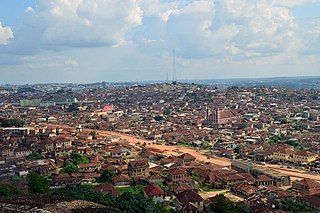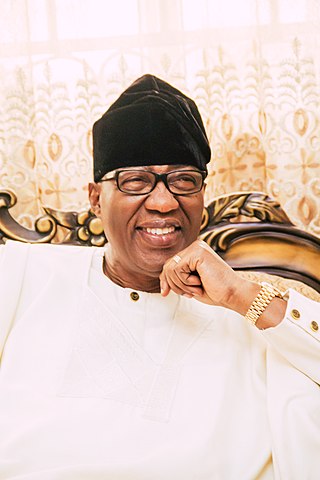Related Research Articles

Ogun State is a state in southwestern Nigeria. Created on 3 February 1976 from the former Western State. Ogun State borders Lagos State to the south, Oyo State and Osun State to the north, Ondo State to the east, and the Republic of Benin to the west. Abeokuta is both Ogun State's capital and most populous city; other important cities in the state include Ijebu-Ode, the capital of the Ijebu Kingdom, and Sagamu, Nigeria's leading kola nut grower. Ogun state is covered predominantly by rain forest and has wooden savanna in the northwest. Ogun State had a total population of 3,751,140 residents as of 2006, making Ogun State the 16th most populated state in Nigeria. In terms of landmass, Ogun State is the 24th largest State in Nigeria with land area of 16,762 kilometer square.

Sagamu or Ishagamu is an agglomeration of thirteen towns in southwestern Nigeria. It is located in Ogun State along the Ibu River and Eruwuru Stream between Lagos and Ibadan. It was founded in the mid 19th century by members of the Remo branch of the Yoruba people. The 13 towns are: Makun, Offin, Sonyindo, Epe, Ibido, Igbepa, Ado, Oko, Ipoji, Batoro, Ijoku, Ijagba and Latawa. It is the capital of Remo Kingdom, and the paramount ruler of the kingdom, the Akarigbo of Remo, has his palace is in the town of Offin.

Gbenga Daniel is a Nigerian politician who served as Senator for Ogun East since 2023. He previously served as governor of Ogun State from 2003 to 2011.

Augustus Taiwo "Tai" Solarin was a Nigerian educator and author. He established the famous Mayflower School, Ikenne, Ogun State in 1956. In 1952, Solarin became the principal of Molusi College, Ijebu Igbo, a post he held till 1956 when he became the proprietor and principal of Mayflower School.
The Church of the Lord (Aladura) was established by Josiah Olunowo Ositelu founded in 1925 and inaugurated in 1930 in Ogere Remo, Ogun State, Nigeria.
Sheila Mary Solarin was a British educator. She was awarded an MBE by Queen Elizabeth II on 17 October 2007 for her educational services in Nigeria. She ran the Mayflower School on behalf of her late husband, Tai Solarin.

The Akarigbo of Remoland is the royal title of the paramount ruler of the thirty three (33) towns that makes up the Remo kingdom in Ogun state in Nigeria The capital of the kingdom is Sagamu or Shagamu also known as Ishagamu and it is made up of thirteen (13) of the thirty three towns that make up the Remo Kingdom. The thirteen towns that makes up Sagamu that congregated there in 1872 for greater security are : Offin, Makun, Sonyindo, Epe, Ibido, Igbepa, Ado, Oko, Ipoji, Batoro, Ijoku, Latawa and Ijagba. The other twenty (20) are: Ipara, Ikenne, Ogere, Okun-owa, Ilisan, Ibese, Ode Remo, Ilara, Isara, Irolu, Akaka, Ikorodu, Odogbolu, Emuren, Imota, Ijede, Gbogbo, Ikosi, and Ijesa-Ijebu.
Iperu or Iperu Akesan Bale Oja is a town near the Ibu River in Ogun State in the southwestern region of Nigeria. It is the most populous town in the Remo Region of the Ikenne Local Government Area. The entire LGA has an area of 137.13 km² and a population of 178,412 at the 2006 census.
The Methodist Church of Sri Lanka is a Protestant Christian denomination in Sri Lanka. Its headquarters is in Colombo and was established on 29 June 1814. It is a member of the World Council of Churches, the Christian Conference of Asia, the National Christian Council of Sri Lanka and the World Methodist Council.

Ogere, is an ancient town in the present Remo Division of Ogun State, Nigeria. The town was founded circa 1401 A.D. Ogere is part of the Ikenne Local Government Area of Ogun State.
Chief Olusegun "Segun" Olusola was a Nigerian television producer, broadcaster and diplomat. He was the writer and executive producer of The Village Headmaster, Nigeria’s longest running television soap opera that stars Justus Esiri and Femi Robinson.
The Ecclesiastical Province of Lagos is one of the 14 ecclesiastical provinces of the Church of Nigeria. It comprises 13 dioceses:
Itele, or Ijebu-Itele, is a town in the Ogun state of Nigeria, about 286 miles (460 km) from Abuja, the country's capital. The community is part of Ijebu-East LGA. It is considered a traditional state because it is headed by a king (Oba) with the royal title of Moyegeso, a part II Oba as stated in the official gazette in 1990 of the Ogun State Government. The incumbent is Oba Mufutau Adesanya Kasali Iboriaran I.

Remo Stars Football Club is a professional football club based in Ikenne, Ogun State, Nigeria. The club competes the Nigeria Professional Football League. the top division of the Nigeria Football League system. They are nicknamed the Sky Blue Stars.

Buruji Kashamu was a Nigerian politician who served as a Senator representing Ogun East in the 8th National Assembly. Ogun East covers eleven local government areas: Ijebu North East, Ijebu North, Ijebu-Ode, Ijebu East, Ikenne, Odogbolu, Remo North, Sagamu, and Ogun Waterside. Senator Kashamu was the vice-chairman of the Senate Committee on States and Local Government.
HRM Oba William Christopher Adedoyin was a Nigerian Traditional ruler who held the title of Akarigbo of Remo Kingdom from 1916 to 1952.

Babatunde Adéwálé Àjàyí is a Nigeria monarch. He is the 19th and current Akarigbo of Remoland, a confederation of towns that neighbor the Ijebu Kingdom in Ogun State.
References
- Mellor, William (August 1969). "What is there between Solarin and Mellor" (Interview). Interviewed by Bayo Olowokere. Lagos: Spear Magazine.
- Olusola, J (1973). Baba Mellor, frontline missionary in Nigeria. Daystar Press, Methodist Church.